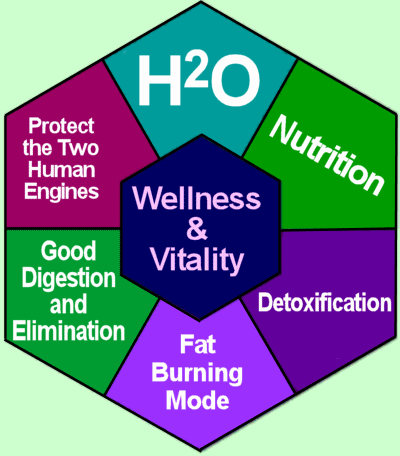
|
|
Health Foundation # 4 is
|
|
|
|
A car engine needs to be protected from heat buildup. That’s why cars have engine cooling systems such as radiators and oil pumps.
Our body’s mitochondrial engines produce free radicals at the rate of 100 quintillion free radicals per second (200,000 superoxide anion radicals per mitochondria per second).. These free radicals are like heat in a car engine. They must be quenched or they will destroy the mitochondria and continue on to damage other parts of the cell as well.
When the mitochondria sense a buildup of free radicals they will switch over to low energy mode. In this mode no more free radicals are produced but also one fourth of the normal amount of energy is produced. This is the mode are bodies are in during sleep.
The mitochondria’s switch over to low energy mode, not only occurs during sleep, but often occurs in the afternoon and as we get older — and free radicals have escalated and the mitochondria seek to protect themselves from more damage.
Protecting the Mitochondria
There are actually quite a few things we can do to protect our mitochondria from free radical damage. Doing these things will enable you to get the “most miles” of out of your cellular mitochondria and stay in high energy mode all day:
Be very picky about what you eat.
Food we eat gets processed by our mitochondria into useable energy... and like using any engine, the more our mitochondria are used, the faster they wear out. In other words, every calorie we eat deteriorates our mitochondria. So, a good practice is to ask yourself if the food you are about to eat is worth the mitochondrial deterioration that will result. Make sure your calories count... either enjoy them very much, get needed energy from them, or eat foods that come loaded with nutrients tools that enhance your wellness and vitality. Or, preferably, do all three at once.
Eat less
If you’re like most people, you have heard many times the concept that we should eat less; that we should leave the table hungry or eat slowly so that our appetite thermostat has a chance to turn off before we over consume. That was wise advice. Studies with animals show that eating half as much food can add 50 to 60 percent to maximum life span by limiting mitochondrial deterioration.
Learn more about the importance of eating less in in order to protect your mitochondria
Supply your mitochondrial engines with “coolants” and “lubricants”
- Superoxide dismutase
- Catalase
- Glutathione
- Alpha Lipoic Acid
- CoQ10
- Acetyl L-Carnitine
The equivalent of mitochondrial coolants are mitochondrial antioxidants. The big four are:
The equivalents of mitochondrial lubricants are:
Learn more about mitochondrial coolants and lubricants
Remove Mitochondrial Toxins (Contaminants)
- Mercury (higher in those with amalgams and fish eaters)
- Aluminum (dietary for all)
- Arsenic (higher in smokers)
- Cadmium (higher in smokers)
- Lead
- Fluoride (water tx)
- Thallium
- Pesticides
- PCB (polychlorinated biphenyls) (multiple)
- Dioxin (multiple)
- PAH and PM (multiple compounds higher in smokers)
- Toluene, Benzene (in 91% & 96% of all persons)
- Trans fatty acids (in all diets except the very careful)
- Phthalates ( multiple)
Mercury
48% of the mercury found inside cells is found inside the mitochondrial. Mercury in the mitochondria does the following:
- It causes severe oxidative damage leading to programmed cell death.
- It robs the mitochondria of glutathione, contributing to the mitochondria entering lower energy production mode.
Fasting
- Fasting each night during sleeping hours, and not eating for three full hours before going to sleep.
- Fasting for longer periods of time.
Scientists believe that during fasting hours is when the mitochondria repair themselves. The way to think about this, is similar to thinking about repairing a freeway. In order to do the repair work traffic, the freeway must be closed to traffic. In this case, the traffic is incoming food to be converted to energy. Two forms of fasting are most beneficial.
Cited Research and Futher Study References:
Learn more about protecting the mitochondria by clicking here.
Dr. Derek Huffman has also done research that shows that although exercise does prevent an early death, it does not increase maximum life span, which under eating does. Read more at http://www.medindia.net/news/Eating-Less-Extends-Life-Span-36725-1.htm
Only one non-transgenic intervention has been reliably shown to increase maximum life span and that is calorie restriction. Read more at: http://iangoddard.net/cr.htm
Back to Top
